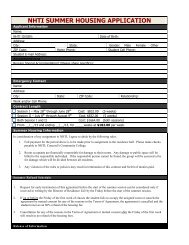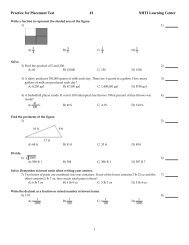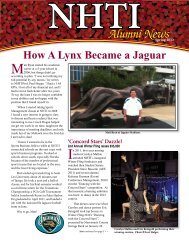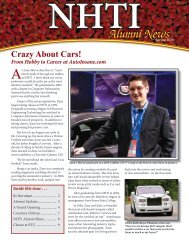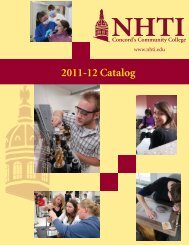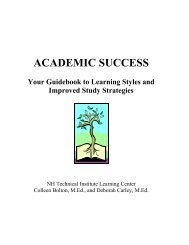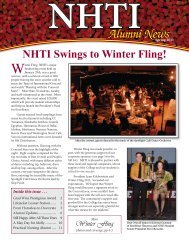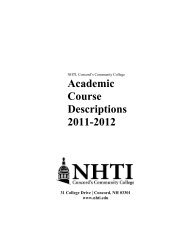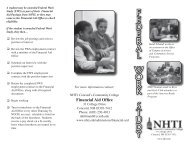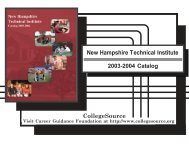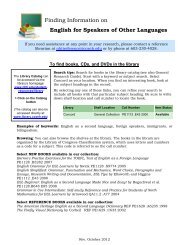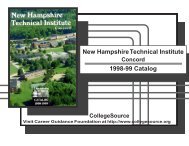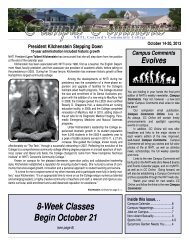Catalog 05-06 - NHTI - Concord's Community College
Catalog 05-06 - NHTI - Concord's Community College
Catalog 05-06 - NHTI - Concord's Community College
- No tags were found...
Create successful ePaper yourself
Turn your PDF publications into a flip-book with our unique Google optimized e-Paper software.
Copyright & Disclaimer Information: Copyright © 1994, 1995, 1996, 1997, 1998, 1999, 2000, 2001, 2002, 2003, 2004, 20<strong>05</strong>, 20<strong>06</strong>, 2007. <strong>College</strong>Source®, Inc. and Career Guidance Foundation. <strong>College</strong>Source® digital catalogs are derivative works owned and copyrighted by <strong>College</strong>Source®, Inc. and Career Guidance Foundation. <strong>Catalog</strong> content is owned and copyrighted by the appropriate school. While <strong>College</strong>Source®, Inc. and Career Guidance Foundation provides information as a service to the public, copyright is retained on all digital catalogs.Copyright & Disclaimer Information: Copyright © 1994, 1995, 1996, 1997, 1998, 1999, 2000, 2001, 2002, 2003, 2004, 20<strong>05</strong>, 20<strong>06</strong>, 2007. <strong>College</strong>Source®, Inc. and Career Guidance Foundation. <strong>College</strong>Source® digital catalogs are derivative works owned and copyrighted by <strong>College</strong>Source®, Inc. and Career Guidance Foundation. <strong>Catalog</strong> content is owned and copyrighted by the appropriate school. While <strong>College</strong>Source®, Inc. and Career Guidance Foundation provides information as a service to the public, copyright is retained on all digital catalogs.Course DescriptionsEducationED 101 Introduction to Exceptionalities 3-0-3This course will introduce the basic values that underlie supporting studentswho experience disabilities and the roles of teachers andparaeducators in supporting those individuals including: the value ofinclusion in home, education, work and community life; respect for theinherent worth and dignity of each person; respect for students’ basicrights to effect the conditions of their own existence. Through readings,in-class discussions, and on-site visits to schools and classrooms, preserviceteachers and paraeducators will develop strategies on how tofacilitate students' independence, learning, social connections, and selfadvocacyskills. Curriculum will emphasize the philosophical and practicalapplications of a variety of theorists with a focus on valuing diversity,collaborating with other educators, curriculum modifications and accommodations,and problem solving strategies (10 hours of classroom observationrequired).ED 104 Foundations of Education 3-0-3This is a survey course which investigates the philosophical, historical andsocial/cultural character of education in the United States. It is intendedto be an examination of how schools function organizationally. Discussionswill include the role of education, system philosophy and trendswhich have shaped contemporary education; field observations are included.This course is a concentration requirement for both SpecialEducation and Education associate degree programs; while it is intendedto be the first in a series of learning experiences for those interested incareers as teachers, it also fulfills a Social Science elective requirement (10hours of classroom observation required).ED 1<strong>06</strong> Paraeducator Portfolio 1-6-3As a requirement of the No Child Left Behind legislation, paraeducatorsmust complete a portfolio demonstrating knowledge and skills competenciesin the areas of math, reading and writing, and the ability to assistin math, reading and writing instruction. This course guides students inthe preparation and completion of the required portfolio through a seriesof workshops and assignments presented at individual school districts.Upon successful completion of the portfolio, students receive a letter ofrecognition from the State of New Hampshire Department of Educationacknowledging they have achieved “highly qualified” status underNo Child Left Behind.ED 200 Supporting Students with Challenging Behaviors 4-0-4This course will provide pre-service teachers and paraeducators withknowledge and skills for supporting students with challenging behaviors,using the framework of positive behavioral supports. Future teachers andparaeducators will gain knowledge of the basic assumptions about thecontext and functions of behavior and understand the role that behaviorplays in helping students influence people and events in their environment,meet their basic needs, and/or avoid unpleasant situations. Bydeveloping strategies to determine the functions of certain behaviors,pre-service teachers and paraeducators will gain new and effective strategiesfor supporting students who demonstrate challenging behaviors inthe classroom. The focus on the teaching of new skills (as opposed tointrusive interventions that rely on the elimination of challenging behaviors)will provide students with effective, positive approaches that respectthe dignity of the individual and facilitate social inclusion (Prerequisite:ED 101 or permission of department head of Education) (20hours of service learning required).ED 201 Legal Issues in Education 3-0-3Predicated upon legislative requirements such as the Individuals withDisabilities Education Act (IDEA), this course considers the theories andissues explored in ED 101, ED 207, ED 204 and ED 212 in the contextof inclusive instructional settings. Students will develop an understandingof the various legal requirements as well as effective instructionalstrategies for curriculum adaptation and delivery within the context ofFederal and NH State Special Education and Education laws and procedures.(Prerequisite: ED 207 or permission of department head ofEducation)ED 203 Teaching Strategies for Diverse Learners 3-0-3The focus of this course is on the development of typical speech andlanguage skills and the effects of various disabilities on language development,including impaired speech, reading, language, and processing. Thecharacteristics of children and youth with language disabilities are discussed.Strategies to assist students’ functioning in school, at home and inthe community are explored. Emphasis is placed on accommodatingstudents versus “helping” students by completing work for them. Avariety of practical techniques is studied and practiced through in and outof class exercises. Collaborative teaching is used by students to demonstratetheir knowledge and skills. In addition, students learn a variety ofstudy strategies, including mnemonics, double column notes, reading strategies,concepts of active versus passive learning, and organization andtime management skills. Students are expected to work in small groups todevelop strategies to teach these various skills to their peers in the class.In addition, students work a minimum of 20 hours in an approved fieldsite. Students maintain a record of their field work. Innovation andcreativity are critical for success in this course. (Prerequisites: ED 101and EN 101; or permission of department head of Education)ED 204 Instructional Technology 3-0-3This course presents the theory and strategies for effective integration oftechnology resources and technology-based methods of instruction, andassistive technology designed for students with disabilities. A backgroundof mediated instruction will be provided along with a review of thequalities and benefits of various technology options, including assistivetechnology, available to instructional settings. Opportunities to applyinstructional delivery using common forms of media, multimedia, computersand specialized programs for students with disabilities will beintegral to this course, in addition to contemplation of future issues ofintegration of technology and matters of time and place of the learningexperience. (Prerequisite: ED 207 or permission of department head ofEducation)ED 207 Teaching and Learning Process 3-0-3An applications-oriented version of the prerequisites, this course providesan examination of the various contemporary theories of teachingand learning. It will focus on developing an understanding of the learningneeds and learning styles of students as individuals in the context of thelearning environment. Attention will also be given to the assorted instructionalmodalities which may be employed and the issues involved inmatching teaching methods to students’ learning styles while consideringthe context and environment of the learning experience. (Prerequisites:ED 101 or ED 104)ED 212 Design of Instruction 3-0-3An introduction to the design and development of the content of learningexperiences. Curriculum theory will be introduced, and an examinationof the processes of curriculum development, use and evaluation willalso be investigated. The broad questions, “What do students need tolearn?” , “How is the learning experience most effectively managed?” and“How do we know the desired outcome was attained?” will be addressed.(Prerequisite: ED 207 or permission of department head of Education)ED 220 Field Experience in Education 1-6-3Practical experience in a learning environment. The student spends aminimum of 45 hours per semester in a supervised assigned learningenvironment and participates in a weekly seminar. In the instructionalenvironment, students will work with individuals and groups, as well asdevelop and deliver an instructional unit. This is a concentration requirementfor the Associate in Science in Education program. (Prerequisite:permission of department head of Education)ED 223 Instructional Approaches in ESOL Tutoring 2-3-3This course focuses on the development of the knowledge and skillsneeded in tutoring ESOL (English for Speakers of other Languages)99



